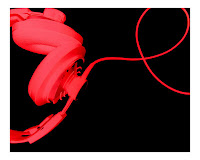I'm a firm believer that you can get great mixes out of virtually any set of speakers in just about any room, and that includes headphones as well. The trick is that you have to have enough listening time to get a reference point as to what sounds good or bad when you play your mix back elsewhere. That's why mixers began to take their own speakers wherever they went (or asked for NS-10s) in the first place. It was something that they were familiar with, and since they were nearfields, the room didn't come too much into play during the mix so they could be surer of the result.
Mixing on headphones does have 4 significant downsides though:
1) You can't wear them for as long as you need to (8, 10, 12 hours) before your head and ears get tired from the extra weight.
2) You have a tendency to turn them up, which can lead to some quick ear fatigue, again limiting your ability to mix for long periods.
3) Because most of the more expensive professional headphones really sound great, you get a false sense of what the mix is like (especially on the low end), and it causes you not to work as hard getting the frequency balance of the mix right.
4) The vast majority of the audience won't listen on phones after the mix is completed. Since a mixer is always aiming for a mix that sounds great on most speakers that the material is played on, you want to stay in that realm if possible, and even listen on some crappy speakers if possible as a check. Headphones just sound too good for that.That said, headphones do have their place. They're great for editing in that you can hear clicks, pops and inconsistencies that you may otherwise miss while listening on speakers, and they're a great check for panning and checking reverb tails when mixing, but I wouldn't personally use them for an entire mix.
But if you're mixing in your bedroom and don't want to wake the the kids, significant other or neighbors, then by all means, go for it. Just make sure that you listen to some other material that sounds great on speakers first so you have a reference point of what sounds good and what doesn't.
Here's a bonus question also from Christine: "Do you think it's optimum to mix in a different studio from where you record, and/or bring in someone with fresh ears who hasn't been there for the recording of all the tracks?"
The only time I think that it's worth going to a different studio to mix is if you think that your mix is going to sound a whole lot better as a result, like in the case of mixing through a console rather than in the box. Otherwise, I'd stay in the same studio that you tracked, if for no other reason than not having to worry about software and plugin compatibilities that always seem to crop up when you go to a different system.
As for getting a different mixer, if you're stuck on the sound of the project for some reason, then it's great to have a fresh set of ears (as in someone else's) for the mix. Also, if you can hire someone who's a great mixer who you think can beat anything that you might come up with, then it may definitely worth it ("may" is the operative word here - you might not get what you expect). Otherwise, I think you're a lot better off using the same team that tracked the song(s) from the beginning for the sake of vision and continuity.
Any other questions? Feel free to send them along to requests@bobbyowsinski.com.
----------------------------------
You should follow me on Twitter for daily news and updates on production and the music business.
Don't forget to check out my Music 3.0 blog for tips and tricks on navigating social media and the new music business.



5 comments:
"4) The vast majority of the audience won't listen on phones after the mix is completed."
I'd beg to differ Bobby. It really depends on what you're mixing and who you're mixing it for.
I'd hazard a guess that music aimed at audiences in their teens to mid-30's will be listened to more on headphones / earbuds more often than any full-range speaker.
Yes, you're absolutely right about that, but most of them listen on crappy earbuds that aren't near the quality of studio headphones. Once again, unless you check the mix on the crappy buds, you might be surprised at the final result.
On speakers your left ear can hear the right speaker, right ear can hear the left speaker. This does not happen on headphones, so the sound stage seems wider; pans seem more extreme. IMO this makes mixing on speakers the greater challenge - another reason to mix on speakers. Also a good reason to check mixes on headphones.
Hello mr Owsinski,
First of all, thank you for these blogs and your books, they have helped me a lot!
You talked about mixing for 8, 10 or 12 hours. I can never mix for more than 4 to 5 hours straight, after that I need a good nights sleep before I can trust my own ears again. This might be to a medical condition, but maybe you have some tips on how to use my time as effectively as possible; or maybe some tips to prolong the time I can focus before fatiguing.
Greetings,
Niels
Niels,
You're not mixing 10 hours straight, which most people can't do. Most mixers take a break every hour or two.
Make yourself comfortable (clothes, room temperature, lighting) and don't listen too loud for long periods of time to cut down on the fatigue.
Post a Comment